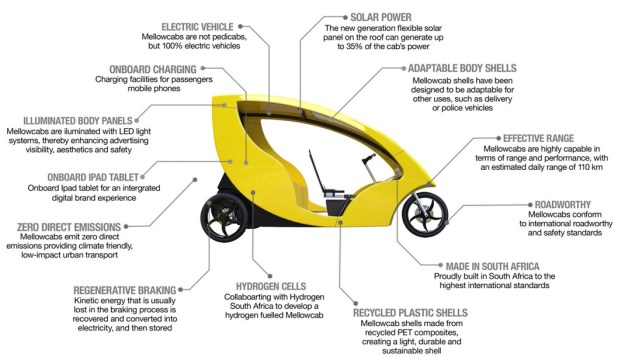Sustainable development in Africa will be brought about by spreading innovation across the continent. It stems from the extreme needs for immediate sustainable solutions for the critical problems facing and threatening its advance to the next phase of development. One of such obstacles to achieve sustainable communities is waste, that either existing, e.g. sanitation, or emerging, e.g. e-waste and waste from fossil remains (mining including oil). Innovation for better healthcare, increased access to quality of education, improved social life, poverty reduction and better life-quality by promoting renewable-based technologies are some examples.
Africa is urbanising and ‘motorising’ faster than any other region in the world. The degradation of the continent’s urban air quality will triple or quadruple within 15 years. Invention of small cars, e.g. electric mini-cabs, such as Mellowcabs (https://youtu.be/UKlkS8ZloRE) that operate on three-wheels with low cost, eco-friendly is a convenient taxi and transport services in that can empower cities across Africa. Other innovations are that these vehicles are being manufactured from recycled materials, and feature state of the art electric motors and batteries. Other multi-layered advances in these small and practical vehicles that are embedded in their technology are ICT-technologies, connectivity, data collection, and analytics are catalysing a technology revolution that could dramatically alter the face of the transport sector in Africa and beyond.
In several previous posts (sustain-earth.com) several issues were addressed to describe and highlight the diverse characteristics of our present era ‘The Anthropocene’ in particular what regards human waste and pollution (sustain-earth.com). In this context, positive and promising innovations to handle, treat and turn waste to beneficial and friendly products in the developing countries, e.g. Africa, are being introduced. Waste and pollution from irresponsible production and consumption are being continuously injected to our main spheres that govern all life forms on planet Earth, e.g. the atmosphere, hydrosphere and biosphere in three forms, physical, chemical and biological remains. The threats has to do with how we use our natural capital resources, including the minerals in the lithosphere, of planet Earth that have caused enormous, continuous and commutative damage to all life forms on planet Earth. Unfortunately, we have accepted and even welcomed all types of waste and pollutions to the level that we are gradually pushing the waste and pollution peak to unknown distant future. A future that doesn’t belong to us. Waste and pollution is described by some people as a ‘hoax’ or ‘fake news’ not created neither by the market nor by us. So, let it be the fate of future generations and the fate of who don’t contribute in ongoing irresponsible production and consumption. It is the current narrative to keep expanding and supporting irresponsible production and consumption. That is the philosophy of denying and refusing to listen to the facts of science that brought us to the point of tip-over of our planet Earth to the very edge of no return. So, would the young generation of Africa manage to change such narratives?

